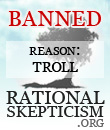Philsophy and Transubstantiation
I am very confused
Moderators: kiore, Blip, The_Metatron
•
27 posts
• Page 1 of 2 • 1, 2
Philsophy and Transubstantiation
Does the meaning of substance defer when an scientist and philosoper uses the term?
I spoke with a catholic about transubstantiation and I thought the cracker and wine is a physical claim that the substances of the wine and crack actually changes to the body of christ. Yet when I say that the catholic guy says its a philosophical claim, I thought what the fuck and I started reading up on trans(cannibalism) sorry bad joke but still didn't get closer to understanding it but also why is substance used differently.
Me - So pretty much the cracker actually changes in the body of christ and the wine?
Catholic - Yes
Me - So there is no symbolism to this?
Catholic - In part
Me - So if I took the cracker / wine from the person after they ate it I should be able to see scientificly that something like dna or the compound structure changed?
Catholic - No the cracker and wine is still the same.
Me - then I went Wha, wait, fuck this is a stupid concept. Either its symbolism or physical no inbetween surely.
That was basic version.
I spoke with a catholic about transubstantiation and I thought the cracker and wine is a physical claim that the substances of the wine and crack actually changes to the body of christ. Yet when I say that the catholic guy says its a philosophical claim, I thought what the fuck and I started reading up on trans(cannibalism) sorry bad joke but still didn't get closer to understanding it but also why is substance used differently.
Me - So pretty much the cracker actually changes in the body of christ and the wine?
Catholic - Yes
Me - So there is no symbolism to this?
Catholic - In part
Me - So if I took the cracker / wine from the person after they ate it I should be able to see scientificly that something like dna or the compound structure changed?
Catholic - No the cracker and wine is still the same.
Me - then I went Wha, wait, fuck this is a stupid concept. Either its symbolism or physical no inbetween surely.
That was basic version.
''Do not argue with an idiot. He will drag you down to his level and beat you with experience.'' - Smart Person at some time.
-

talkietoaster - THREAD STARTER
- Posts: 1612
- Country: UK

Re: Philsophy and Transubstantiation
I guess it's similar to the way Jesus didn't come back as a man but as a god-man. He wasn't literally a dead man returned walking around. He was something new. Don't know why the empty tomb was needed, but how and ever. So the cracker literally becomes Jesus's body and blood in the same way the returned Jesus was literally the body and blood of Christ.
Makes sense when you see it that way.
Makes sense when you see it that way.
A most evolved electron.
-

Animavore - Name: The Scribbler
- Posts: 45108
- Age: 45


Re: Philsophy and Transubstantiation
Animavore wrote:I guess it's similar to the way Jesus didn't come back as a man but as a god-man. He wasn't literally a dead man returned walking around. He was something new. Don't know why the empty tomb was needed, but how and ever. So the cracker literally becomes Jesus's body and blood in the same way the returned Jesus was literally the body and blood of Christ.
Makes sense when you see it that way.
How does a catholic know its blessed properly or its the body of christ? How do they know there is a change?
Does the cracker change its flavour or something? As least that would show a change without changing the substance of the cracker?
''Do not argue with an idiot. He will drag you down to his level and beat you with experience.'' - Smart Person at some time.
-

talkietoaster - THREAD STARTER
- Posts: 1612
- Country: UK

Re: Philsophy and Transubstantiation
talkietoaster wrote:Animavore wrote:I guess it's similar to the way Jesus didn't come back as a man but as a god-man. He wasn't literally a dead man returned walking around. He was something new. Don't know why the empty tomb was needed, but how and ever. So the cracker literally becomes Jesus's body and blood in the same way the returned Jesus was literally the body and blood of Christ.
Makes sense when you see it that way.
How does a catholic know its blessed properly or its the body of christ? How do they know there is a change?
Does the cracker change its flavour or something? As least that would show a change without changing the substance of the cracker?
Because the Bible. Sheesh!
A most evolved electron.
-

Animavore - Name: The Scribbler
- Posts: 45108
- Age: 45


Re: Philsophy and Transubstantiation
It doesn't make any sense and is unjustifiable, which should be your usual reaction when someone says "it's a philosophical claim."
"They call it the American dream, because you have to be asleep to believe it." -- George Carlin
-

SafeAsMilk - Name: Makes Fails
- Posts: 14774
- Age: 44


Re: Philsophy and Transubstantiation
Animavore wrote:talkietoaster wrote:Animavore wrote:I guess it's similar to the way Jesus didn't come back as a man but as a god-man. He wasn't literally a dead man returned walking around. He was something new. Don't know why the empty tomb was needed, but how and ever. So the cracker literally becomes Jesus's body and blood in the same way the returned Jesus was literally the body and blood of Christ.
Makes sense when you see it that way.
How does a catholic know its blessed properly or its the body of christ? How do they know there is a change?
Does the cracker change its flavour or something? As least that would show a change without changing the substance of the cracker?
Because the Bible. Sheesh!
I am in disbelief, I heard of transubstantiation but never really learned about its philosophy in Catholism and its just made me think you can level up in gullability in catholism. Level 1 - Just believe in god, level 2 - Believe in the Resurrection, Level 3 - Believe in Transubstantiation etc..... It's just a scary thought process for me to ever be in.
''Do not argue with an idiot. He will drag you down to his level and beat you with experience.'' - Smart Person at some time.
-

talkietoaster - THREAD STARTER
- Posts: 1612
- Country: UK

Re: Philsophy and Transubstantiation
talkietoaster wrote:Animavore wrote:talkietoaster wrote:Animavore wrote:I guess it's similar to the way Jesus didn't come back as a man but as a god-man. He wasn't literally a dead man returned walking around. He was something new. Don't know why the empty tomb was needed, but how and ever. So the cracker literally becomes Jesus's body and blood in the same way the returned Jesus was literally the body and blood of Christ.
Makes sense when you see it that way.
How does a catholic know its blessed properly or its the body of christ? How do they know there is a change?
Does the cracker change its flavour or something? As least that would show a change without changing the substance of the cracker?
Because the Bible. Sheesh!
I am in disbelief, I heard of transubstantiation but never really learned about its philosophy in Catholism and its just made me think you can level up in gullability in catholism. Level 1 - Just believe in god, level 2 - Believe in the Resurrection, Level 3 - Believe in Transubstantiation etc..... It's just a scary thought process for me to ever be in.
Look! Wiki makes it absolutely clear.
In Roman Catholic theology, transubstantiation (in Latin, transsubstantiatio, in Greek μετουσίωσις metousiosis) is the doctrine that, in the Eucharist, the substance of the bread and the wine used in the sacrament is literally, not merely as by a sign or a figure, but in actual reality as well,[1][2] changed into the substance of the Body and the Blood of Jesus,[3] while all that is accessible to the senses (the physical[citation needed] appearances - species[4][5][6] in Latin) remains unchanged.[7][8] What remains unaltered is also referred to as the "accidents" of the bread and wine,[9] but this term is not used in the official definition of the doctrine by the Council of Trent.[10]
http://en.wikipedia.org/wiki/Transubstantiation
A most evolved electron.
-

Animavore - Name: The Scribbler
- Posts: 45108
- Age: 45


Re: Philsophy and Transubstantiation
I guess it just goes to show that no amount of advancement in the scientific understanding of how the molecular structre of substances affect how they look, taste, smell, etc. is going to do much to overturn an argument that, if philosophically sound, was never in the least bit grounded in reality in the first place.
"Last night was the most horrific for Kyiv since, just imagine, 1941 when it was attacked by Nazis."
- Sergiy Kyslytsya
- Sergiy Kyslytsya
-

Matt_B - Posts: 4888

- Country: Australia

Re: Philsophy and Transubstantiation
The only philosophical question of importance I can see here. Is whether or not people who believe in this nonsense should be able to hold political office.
-

Ihavenofingerprints - Posts: 6903
- Age: 31


Re: Philsophy and Transubstantiation
Matt_B wrote:I guess it just goes to show that no amount of advancement in the scientific understanding of how the molecular structre of substances affect how they look, taste, smell, etc. is going to do much to overturn an argument that, if philosophically sound, was never in the least bit grounded in reality in the first place.
Exactly. You can only overturn it on philosophical grounds. Which I'm not really sure can be done to any idea one is sufficiently invested in believing.
Animavore wrote:Because the Bible. Sheesh!
I'm not sure if it's even supported by the Bible. It may be purely Catholic dogma, which is not necessarily derived from scripture.
"A community is infinitely more brutalised by the habitual employment of punishment than it is by the occasional occurrence of crime." -Oscar Wilde
-

Shrunk - Posts: 26170
- Age: 59

- Country: Canada

Re: Philsophy and Transubstantiation
BTW, I think this issue is a perfect example of how NOMA is used in practice.
"A community is infinitely more brutalised by the habitual employment of punishment than it is by the occasional occurrence of crime." -Oscar Wilde
-

Shrunk - Posts: 26170
- Age: 59

- Country: Canada

Re: Philsophy and Transubstantiation
It's derived from Aristotelian ideas, isn't it? I wouldn't say that it stems from the Bible really, which is why the reformers tended to reject it (except Luther).
je suis Marxiste, tendance Groucho.
- nunnington
- Posts: 3980
Re: Philsophy and Transubstantiation
Jeez! I was being facetious. Actually the Wiki article I posted above says that,
Not sure what any of that means. Sounds like complete waffle. Especially as you go on to read...
Um... What?
"The distinction between "substance" and "accidents" - the latter term is not used in the Catholic Church's official definition of the doctrine[10] but has been used in the writings of theologians - arose from Aristotelian philosophy, but in Roman Catholic eucharistic theology is independent of that philosophy, since the distinction is a real one, as shown by the distinction between a person and that person's accidental appearances.[42] "Substance" here means what something is in itself, its essence."
Not sure what any of that means. Sounds like complete waffle. Especially as you go on to read...
A hat's shape is not the hat itself, nor is its colour, size, softness to the touch, nor anything else about it perceptible to the senses. The hat itself (the "substance") has the shape, the color, the size, the softness and the other appearances, but is distinct from them.[43] While the appearances, which are also referred to, though not in the Church's official teaching, by the philosophical term 'accidents', are perceptible to the senses, the substance is not.[44]
Um... What?
A most evolved electron.
-

Animavore - Name: The Scribbler
- Posts: 45108
- Age: 45


Re: Philsophy and Transubstantiation
I suppose it stems from the Bible in one sense, since Jesus is recorded as saying 'this is my body'. However, he also says stuff like 'I am the light of the world', and 'I am the vine', and you don't see people trying to work out how this leads to horticulture. But I guess historically, it focusses the meaning of the Mass, as an actual enactment, whereas the reformers tended to say that it is a remembrance (except Luther). Hence, in the Reformation the former view of the Mass was fiercely attacked.
je suis Marxiste, tendance Groucho.
- nunnington
- Posts: 3980
Re: Philsophy and Transubstantiation
I think this goes some way into explaining it.
In a nutshell - When we eat food all the elements in that food become our body, our flesh, even though they are still the same water, salt, potassium etc... They are no longer these individual elements they are now human. When the bread and wine are transformed into the body and blood of Christ they still remain looking like bread and wine but like those foods we eat they have been transformed into flesh and soul (I guess Catholics are animavores as well as cannibals).
So touching the bread is touching the flesh of Jesus in the same way touching someone's hand is not touching the individual cells and water and chemicals but actually touching that person.
I guess spilling the wine by accident it like knocking someone down and splitting their skull on the ground
Consider the classic example[45] of the human body. All of the separate chemical compounds, minerals and water—which when piled together constitute the sum total of the actual physical matter of the human body—are not of themselves a human body, however much they may be physically compounded and mixed and rearranged in the laboratory, since they are still only a pile of organic chemicals, minerals and water in a particular complex configuration. If this has never been alive it is not a human body. If they are participant in the integral physical expression of a living human being who has absorbed and metabolized them, or if they are now the physical remains of a once-living human being, the substance of what they actually are is human, hence, a human body. The substantial reality of what is before us is human. The substance (substantial reality) of what is seen is not solely that of a complex organization of organic chemical compounds, but is (or has been) someone. The chemical elements of the food a person eats become in a few hours part of that person's human body and are no longer food but have been turned into the human flesh and blood and bone of that person, yet the physical chemical elements of what was once food remain the same (calcium, copper, salt, protein, sugars, fats, water, etc.). The substance of any matter that has become an integral part of any human being has ceased to be the substance or reality of food and has become incorporated as an integral part of the physical manifestation or expression of that human person. To touch that matter now is not to touch a batch of chemical compounds or food but to touch that person.[46]
When at his Last Supper, Jesus said: "This is my body",[47] what he held in his hands still had all the appearances of bread: the "species" remained unchanged. However, the Roman Catholic Church teaches that, when Jesus made that declaration,[48] the underlying reality (the "substance") of the bread was changed into that of his body. In other words, it actually was his body, while all the appearances open to the senses or to scientific investigation were still those of bread, exactly as before. The Catholic Church holds that the same change of the substance of the bread and of the wine occurs at the consecration of the Eucharist[49] when the words are spoken in persona Christi "This is my body ... this is my blood." In Orthodox confessions, the change is said to start during the Liturgy of Preparation and be completed during the Epiklesis.
In a nutshell - When we eat food all the elements in that food become our body, our flesh, even though they are still the same water, salt, potassium etc... They are no longer these individual elements they are now human. When the bread and wine are transformed into the body and blood of Christ they still remain looking like bread and wine but like those foods we eat they have been transformed into flesh and soul (I guess Catholics are animavores as well as cannibals).
To touch the smallest particle of the host or the smallest droplet from the chalice is to touch Jesus Christ himself, as when one person touches another on the back of the hand with only a fingertip and in so doing touches not merely a few skin cells but touches the whole person:
So touching the bread is touching the flesh of Jesus in the same way touching someone's hand is not touching the individual cells and water and chemicals but actually touching that person.
I guess spilling the wine by accident it like knocking someone down and splitting their skull on the ground
A most evolved electron.
-

Animavore - Name: The Scribbler
- Posts: 45108
- Age: 45


Re: Philsophy and Transubstantiation
Wait, so jesus's resurrected body is made of wheat flour, and his blood is made of fermented grape juice?
-

scott1328 - Name: Some call me... Tim
- Posts: 8849


Re: Philsophy and Transubstantiation
scott1328 wrote:Wait, so jesus's resurrected body is made of wheat flour, and his blood is made of fermented grape juice?
You are what you eat, as the saying goes.
"Last night was the most horrific for Kyiv since, just imagine, 1941 when it was attacked by Nazis."
- Sergiy Kyslytsya
- Sergiy Kyslytsya
-

Matt_B - Posts: 4888

- Country: Australia

Re: Philsophy and Transubstantiation
The idea gets more messed up the more I think about it.
By the Church's view when I drink water it goes into my cells and becomes 'Ani-substance' and is no longer water. When I piss or sweat do I piss or sweat out 'Ani-substance' or does it stop being 'Ani-substance' and start just being water and potassium again the moment it leaves my body or hits the ground? At what stage does the water end and I begin? Does all water on Earth contain a multitude of plant and animal 'substance' from throughout history? Is this related to the magical thinking behind homoeopathy? Is a pork-chop, which is fleshy, the 'substance' of the pig from whence it came? Can pig, or other, 'substance' be divided? When does the 'substance' of a tree become 'table-substance'? Is the universe, all coming from the big-bang, of one 'substance' rendering Aristotle or the Church's notion of differing 'substance' redundant? Is there any substance to the notion of 'substance'?
By the Church's view when I drink water it goes into my cells and becomes 'Ani-substance' and is no longer water. When I piss or sweat do I piss or sweat out 'Ani-substance' or does it stop being 'Ani-substance' and start just being water and potassium again the moment it leaves my body or hits the ground? At what stage does the water end and I begin? Does all water on Earth contain a multitude of plant and animal 'substance' from throughout history? Is this related to the magical thinking behind homoeopathy? Is a pork-chop, which is fleshy, the 'substance' of the pig from whence it came? Can pig, or other, 'substance' be divided? When does the 'substance' of a tree become 'table-substance'? Is the universe, all coming from the big-bang, of one 'substance' rendering Aristotle or the Church's notion of differing 'substance' redundant? Is there any substance to the notion of 'substance'?
A most evolved electron.
-

Animavore - Name: The Scribbler
- Posts: 45108
- Age: 45


Re: Philsophy and Transubstantiation
It can be overturned, just not by science. Austere nominalism, for instance, runs contrary to it. Many accounts run contrary to that of substance. Ask yourself what we or virtually any thing is. Is it just a collection of properties, a bundle? or something more, something which is that which receives the properties, holds them.
Christ said, "I am the Truth"; he did not say "I am the custom." -- St. Toribio
-

Mick - Banned Troll
- Posts: 7027
27 posts
• Page 1 of 2 • 1, 2
Who is online
Users viewing this topic: No registered users and 1 guest